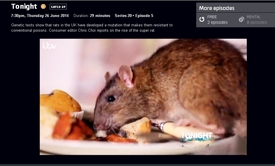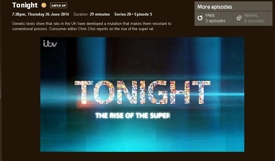Last nights ITV programme in the Tonight series on the Rise of the Super Rats was a well balanced and informative review of the rise of rodenticide resistance and the threat to public health posed by rats.
The programme was prompted by the recent sensational coverage in the printed press of giant super rats invading UK cities and towns and the current government-led debate on the future of rodenticides, due to conclude this autumn.
The investigation by Tonight’s consumer editor, Chris Choi, was a well put together programme that not only avoided sensationalising the topic but also cast doubt on the giant rat photos by interviewing Lesley Reed from UK Pouchies who pointed out that the rats pictured were most likely of giant African pouched rats – the species which we featured back in our November & December 2012 issue of Pest magazine that are saving lives by sniffing out landmines and diseases like TB and is also kept as a domestic pet.
|
The programme featured Dr Dougie Clarke from Huddersfield University who described the widespread incidence of rodenticide resistance as a time bomb and Professor Steven Belmain from the University of Greenwich who explained how one rat can produce 120 rats in 120 days. Explaining how super rats look no different to normal rats but have a DNA mutation that lets them survive the use of the poisons approved for consumer and outdoor use, the programme highlighted that these anticoagulants have been around since the 1950s. Iain Turner from the National Pest Technicians Association (NPTA) spoke about the need for professional pest control and how the free service that used to be offered by councils is a thing of the past. He said that people will have to get used to paying a proper fee for a professional job. |
|
|
David Ramsden from the Barn Owl Trust raised the wildlife concerns and put forward his view that the only long term solution is to remove food source and harbourage – but as pest professionals know all too well that’s much easier to say than to do. Kevin Moore from Surekill in Leeds demonstrated how rubbish is attracting rats and how once the rats get into one property in a terrace they quickly moved through the whole block. Graham Jukes from the Chartered Institute of Environmental Health (CIEH) emphasised the importance of rodent control in safeguarding public health and put forward the Institute’s view that what is needed is a statutory Code of Practice not the voluntary code currently under discussion and that rodenticides should only be used by those who are properly trained and not by householders. Capturing the wildlife versus public health dilemma perfectly environmentalist and bird expert Bill Oddie who described his experience when 30 to 40 rats took over his garden bird feeders. “I thought about trying to trap them in humane traps but then what would I do with 30 or 40 rats where would I take them? We had to get a man in!” If you didn’t get chance to see the programme Rise of the Super Rats will be available on the ITV player until 26 July and it is well worth spending the 30 minutes required to view it. Please note that you have to register to use ITV player and/or log in to view the programme. Note: If you received our Pest+ Alert and were expecting to see Dr Alan Buckle then it wasn’t that he was cut out of the programme, it was just that, due to other commitments, he was unable to take part on this occasion. |
|



